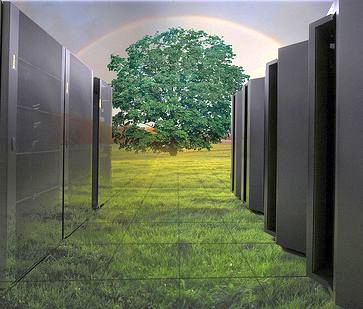Data Center UPS- Know What Your Data Center Needs
Power failure is a problem that is fairly common in all parts of the world; one can hardly say that this concern is restricted to data centers. But seeing as how a blackout in a data center could spell disaster, an uninterruptible power supply battery is no longer a recommendation; it is a must. In order to set up a fail- proof UPS for your data center, one will have to know what options one has.
UPS is More Than Just Backup
Unlike popular understanding, a UPS not only supplies power to the data center in the event of a power failure, it also, to an extent, protects the data center from transients, power sags, power swells, harmonic distortions and frequency instability. A good UPS system can also improve the power utilization efficiency (PUE) of the data center. It should be noted that a UPS can support the operation of the data center for a very short interval of time- only till electricity can be switched to an auxiliary power source.
Types of UPS
There are basically three types of UPS systems available today:
- Standby power system– this system offers the most basic features of surge protection and battery backup. Electricity is supplied directly to the load and standby power is invoked only during power failure. When the power dip exceeds a certain preset value, the control switches over to the standby UPS which usually takes about 25 milliseconds.
- Line interactive power system– This type of UPS system maintains the inverter in line and switches the battery power in the event of power loss. This system makes use of an autotransformer which supplies only the difference in power when there is a dip in voltage. More number of taps on the autotransformer increases the cost and complexity of the system.
- Double conversion on-line UPS– In this type, AC power is drawn from the power supply, gets rectified to DC and charges the batteries and once again gets converted to AC by an inverter for powering the protected devices. This system is more expensive and may be considered for incorporation for equipments that are highly sensitive to power fluctuations. Since the battery is always connected to the inverter, switchover is instantaneous. But care should be taken to avoid overcharging of the batteries. This system provides constant output irrespective of the level of disturbance in the input.
UPS Also Requires Backup!
With that said, one should also take into consideration that UPS may also fail in some scenarios. One large UPS supplying power to all servers is not  advisable. Instead, opt for multiple smaller UPS modules with either N+1 configuration or 2N configuration (where N is the number of batteries required to sustain the data center load).
advisable. Instead, opt for multiple smaller UPS modules with either N+1 configuration or 2N configuration (where N is the number of batteries required to sustain the data center load).
UPS Maintenance
UPS, like all other data center equipments, must be monitored regularly and maintenance is a must. The batteries should be checked for acid and hazardous gas leaks. A number of third party companies provide thorough and complete UPS maintenance services.
Remember, the type of UPS one might want to opt for depends solely on the requirement and the data center load. One requires complete understanding of the load demands of the data center. An underpowered UPS system is equivalent to no UPS at all. One can seek the help of leading UPS system experts such as Liebert Systems, APC, Senitel Power, Eaton etc so that the UPS system that is finally fitted into a data center is exactly what the data center needs.
For more insights into the data center world, visit Data Center Talk.

